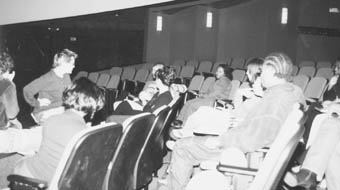Last September, colleges in the Greensboro area began to talk. Their conversation, which took the form of a series of Town Hall meetings, centered on the issue of racial reconciliation. On Thursday, Nov. 8, Guilford’s African American Affairs internship class sponsored the latest discussion.
The previous meetings, held at local schools such as Salem College, were conducted as panel discussions. Presenters from various schools spoke, and audience members asked questions. While this was valuable, junior intern Rose Wilson, who co-hosted last week’s meeting along with Erin Beacham, said that the discussion “stayed pretty surface.”
“We decided to do things a little differently, being Guilford and all,” said Santes Beatty, Director of African American Affairs and Multicultural Services.
The town hall meeting, Guilford style, began with a group discussion of several controversial words, including prejudice, bigotry, and racism. The goal was to agree on definitions, to find “a common language so that we can move towards action,” said the flier the internship class passed out.
Next, the audience was divided into four small groups. Wilson and Beacham ushered each to a classroom and instructed them to discuss. Although this portion of the evening was designed to give participants the opportunity to really delve into the issues, it seemed that no time at all had passed before the two returned to announce that the half-hour was almost up.
The next phase of the meeting involved a series of questions. Participants from each of the represented schools, which included Greensboro and Bennett Colleges as well as Guilford and Salem, put together informal summaries of multiculturalism and anti-racism on their campuses.
Despite the mention of many multicultural organizations on campus, most Guilford students in attendance seemed to agree that the school has a long way to go before becoming a truly inclusive institution. “The fact that we have so many minority groups on campus and the majority of the students don’t know about them says something about our race issues,” said Neena Robertson, president of Guilford’s African American Cultural Society.
If the heart of the racial issues on this campus is, in fact, such ignorance, perhaps the Town Hall Meeting has done some work to combat that. While some felt that talks dealt only with the surface of the real issues, it is certain that meetings such as the one last Thursday foster the extension of such conversation in which real depth can be achieved.

